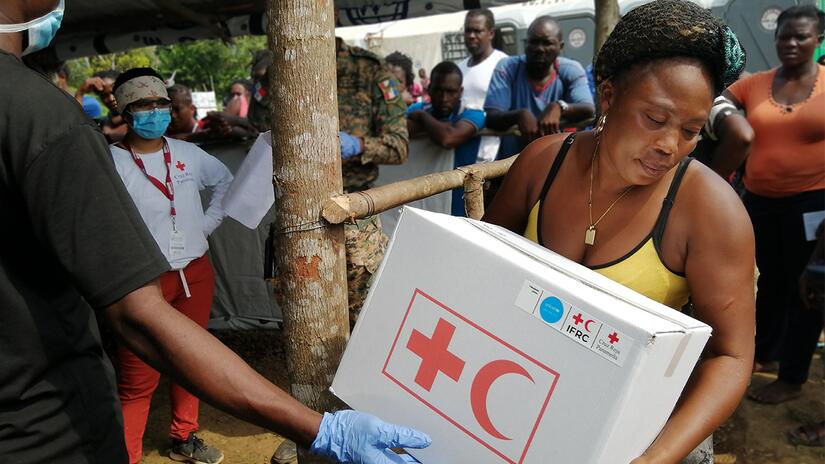With the support of the International Federation of Red Cross and Red Crescent Societies (IFRC), the Panamanian Red Cross has been working on its institutional and operational strengthening in order to expand its service offerings to Panama not only in response to COVID-19 but also in attention to migrant populations, preparation for the rainy season as well as other actions at the community level.
As part of the response to COVID-19, the Panamanian Red Cross initially received 25,000 Swiss francs in cash and more than 15,000 Swiss francs in protection equipment as part of the IFRC's International Appeal. Due to the increase in cases, the Panamanian Red Cross has revised its COVID-19 action plan and the IFRC has agreed to increase support to the National Society to an additional 50,000 Swiss francs to enable it to implement actions in psychosocial support, food vouchers, key messages and community health services to those directly or indirectly affected by COVID-19. In addition, it will soon donate 2 ambulances and will make a new delivery of personal protection equipment for the amount of 40 thousand Swiss francs.
"The IFRC is committed to Panama and the Panamanian Red Cross. The presence of the IFRC in the Humanitarian Hub of Panama obliges us to accompany the strengthening of our local National Society and enhance the strengths of the Hub not only at the logistical level, but fundamentally at the level of cooperation, training and management of timely information that allows evidence-based decision making. We are committed to Panama, which is why we make available to the country the knowledge and experience of the largest humanitarian network in the world, to work on prevention and mitigation, and thus together recover from this pandemic that keeps the country isolated," said Walter Cotte, IFRC Director for the Americas.
Elías Solís, President of the Panamanian Red Cross said, "The Panamanian Red Cross is making the necessary institutional strengthening efforts to offer Panama a diversification of services and quality programmes that will not only allow us to contribute to the national response to the current contingency, but also to continue working on strengthening community resilience. For us it is an advantage to have the Regional office for the Americas of the IFRC in Panama, not only for our institution but for the Republic of Panama in general because we can benefit from the technical knowledge and the capacity of articulation of the IFRC with partners not only from the International Red Cross Movement but from the United Nations system, as well as donors at the global level”.
The IFRC together with the Panamanian Red Cross and the International Committee of the Red Cross (ICRC) have been supporting the efforts of the Panamanian government in the care of migrants who are in a situation of extreme vulnerability in Darién. The IFRC maintains a regional appeal on migration. Through this appeal, the Panamanian Red Cross has requested the extension of funds to make larger purchases of inputs through the Logistics Hub, in order to provide the required humanitarian assistance.
The migration actions and attention to host communities have been expanded thanks to an alliance with UNICEF and other internal and external partners, through which 12,700 people have benefited in health care, more than 38,000 people have been reached with more than 2.4 million liters of safe water, 700 people have been benefited with the supply of materials and tools for the construction of emergency shelters, implementation of a distribution system that serves 1. 600 people who receive daily distributions. In addition, more than 4,300 packages of cleaning and hygiene products and water storage have been distributed, and with ICRC support some 200 people have been assisted by the Restoring Family Links programme. Reliable information on COVID-19 and the legal situation of migrants and on the details of their stay in the shelter has also been distributed, reaching more than 19,000 people.
"The situation of migrants throughout the region is very worrying, and these people generally have little access to health systems and minimum preventive measures for COVID-19 and are exposed to other protection risks that increase their vulnerability, which is why we at the Red Cross in the Americas are making efforts to ensure that migrant populations, as well as other vulnerable populations such as indigenous communities, elderly, LGBTQI people, people living with HIV and people with disabilities, are considered in all plans for responding to the pandemic in the region," said Walter Cotte.
Article
Sudan: 'the most difficult year' after outbreak of conflict
Sudan: 'the most difficult year' after outbreak of conflict
| Article

